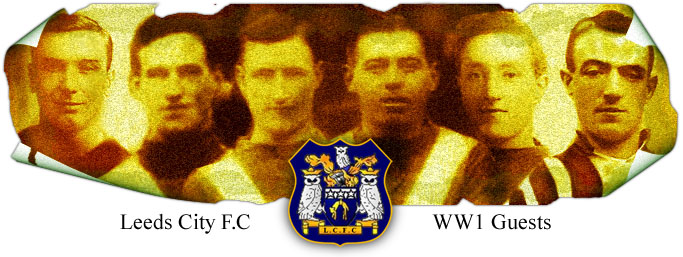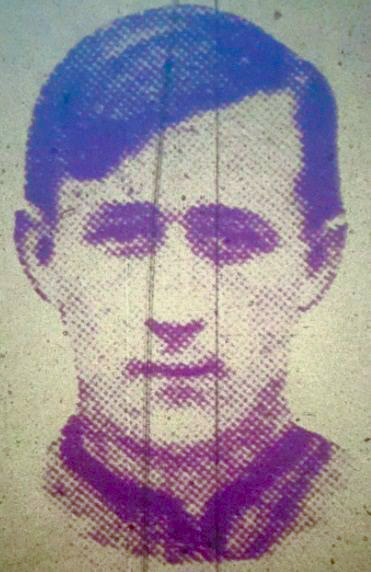

Bennett: Thomas Samuel (Tom)
1915-1916 (Leeds City War-time Guest Player Details)
Inside Right
Born: Walton, Liverpool, Lancashire: 16-08-1891
Debut: v Derby County (a): 04-09-1915
Height & Weight: 5ft 8ins, 11st 7lb (1916)
He was brought up in Liverpool and attended the Venice Street School which was his first association with football when he represented the school as an inside-right,
but his father was a seafarer and a good athlete, particularly as a one mile runner. After finding work, he and his family emigrated to St John’s, New Brunswick, Canada.
For three years the young Bennett did not play football. However, when his folks went further west to Montreal, he joined Montreal Royal Rovers, and remained for six years
with that club. He was their inside right, and he earned honours in their local league, and in his last three seasons took part in their “international” match between England
and Scotland. He was also one of the Montreal team against Toronto, and in his fifth year appeared against the Corinthians when they visited Canada. For two months in
his fourth campaign with the Rovers he helped the Charlestown club at Boston, where Stanley Fazackerley was playing at inside left. Advised by Mr. W.G. Hay, a Scottish
referee across the Atlantic, to return to England, he re-crossed the ocean. Glasgow Rangers, Newcastle United, and Liverpool were on the look-out for him, but the late Mr.
Tom Watson had the advantage, as Bennett’s friends lived in his native city. So, in November, 1913, Bennett turned out for Everton Reserves against the Marine, a local
team, and scored three goals, but after a month’s trial as a centre-forward he was not retained. His talent could not be repressed and he joined South Liverpool, then of the
Lancashire Combination, the following month. He was soon amongst the goals, scoring fourteen in just thirteen games for the balance of the 1913-14 season while in the
following season of 1914-15 he even surpassed that with thirty-four goals in twenty-three appearances, mainly as a centre-forward. The start of the 1915-16 season saw
him as a War-timeguest at Leeds City. The Football League granted him permission to play for City because he was working in Leeds at the time. Bennett immediately
impressed when he played for the Peacocks' reserves against the first team in a pre-season trial. The Leeds Mercury wrote that he had been "a prominent forward, and his
style resembles that of McLeod." He did well enough to be selected at inside-forward for the opening game, away to Derby County at the Baseball Ground on 4th September
1915, playing inside another debutant, the celebrated Fanny Walden. In a front line consisting of Fanny Walden, Tommy Bennett, John Edmondson, Arthur Price and Fred
Croot. In such illustrious company it was not hard to shine and he scored on debut. He scored the second, decisive goal in a 3-1 victory, netting from a centre by Fred Croot
fifteen minutes from time. He retained his place, and after the 2-1 defeat of The Wednesday at Elland Road the following week, the Mercury said, "Bennett, who comes from
South Liverpool, is a useful man and the understanding between him and Walden was perfect." Bennett continued to perform, scoring again a week later in a 4-3 defeat at
Bradford Park Avenue. The Yorkshire Post reported: "The Leeds inside-right cleverly outwitted the defenders, and concluded with a hard shot, the ball striking the underside
of the crossbar and going into the net." Bennett dropped down the pecking order when Clem Stephenson arrived at Elland Road the following February. In all he scored four
times in his eighteen appearances for City, including one game at centre-forward, though the Evening Post acknowledged that was a mistaken ploy: "It was plainly evident
that Bennett is not the man Leeds requires for the position of centre-forward - he had neither the command of the ball nor the inventiveness necessary to adequately fill the
post." Bennett dropped down the pecking order when Clem Stephenson arrived at Elland Road the following February. In all he scored four times in his eighteen appearances
for City, including one game at centre-forward, though the Evening Post acknowledged that was a mistaken ploy: "It was plainly evident that Bennett is not the man Leeds
requires for the position of centre-forward - he had neither the command of the ball not the inventiveness necessary to adequately fill the post." His third goal came in a 7-1
romp on 16th October 1915, in which Arthur Price delighted the Elland Road crowd of 7,000 as he went nap against Barnsley. He had to wait until 27th December 1915 for
his fourth goal as Sheffield United took all the points at Elland Road with a 3-2 win, with Bennett scoring the first goal for Leeds. Bennett dropped down the pecking order
when Clem Stephenson arrived at Elland Road the following February. In all he scored four times in his eighteen appearances for City, including one game at centre-forward,
though the Evening Post acknowledged that was a mistaken ploy: "It was plainly evident that Bennett is not the man Leeds requires for the position of centre-forward - he had
neither the command of the ball not the inventiveness necessary to adequately fill the post." Bennett slipped out of the Elland Road plans thereafter. Although generally Walden’s
inside partner, he occupied the three inside positions in the course of eighteen matches between 4th September 1915 and 5th February 1916, but he only netted four goals, in
that period. However, the arrival of Clem Stephenson and, soon afterwards, Arthur Price from injury, meant he was surplus to City’s requirements. While with Leeds his health
was not satisfactory, and he resumed his connection with South Liverpool. There he remained until 11th November 1916, when Liverpool had to visit Southport Central just at
the time that Fred Pagnam had joined the artillery, and on the day that Ephraim Longworth was playing for the League in the Cameron benefit match at Newcastle. Although
he did not score at Southport or in the next two matches, his display against Everton at Anfield on 2nd December that stamped him as a dashing raider, a fine leader, although
moved to inside right because of Pagnam’s visit, and a deadly shot. Within the next few weeks his position as the centre-forward was assured beyond question. In all he scored
twenty-two goals for Liverpool in 1916-17, nineteen in League games in twenty-four appearances and three in a friendly match against Leeds City at Newcastle. During the
1917-18 season he scored in every match from 1st September to 8th December, and up to 9th February he scored thirty-five goals. The net result is fifty-seven goals in forty-nine
contested, in the course of which he had secured three goals against Bolton Wanderers, four against Port Vale, five against Rochdale, and two in a match on thirteen occasions’
Centre-half backs, left backs and goalkeeper are now all bent on foiling Bennett, and still he scores. In 1917-18 he managed forty-eight goals in thirty-five appearances for
Liverpool in the Lancashire Division of the War League competition before scoring ten goals in eleven games in the 1918-19 season before peacetime fixtures recommenced.
He was signed by Liverpool for the 1919-20 season. He made his League debut in Liverpool's ninth League game of the season, on 11th October 1919, as a replacement for
Fred Pignam, who had played the previous eight games, as Liverpool visited Chelsea at Stamford Bridge, in which the Pensioners won 1-0 with a Harold Brittan goal in front
of a crowd of 35,000. It turned out to be his only League game for Liverpool. But Bennett and Fred Pignam never played for Liverpool again. Sadly Bennett contracted
tuberculosis and was awarded a benefit match at Anfield on 27th September 1920 featuring Liverpool against an International XI. His abilities were noted in the Athletic News
of 12th February 1918 “The Liverpool centre does not owe his success to mere physique, for he is only 5ft. 7½in. and 11st. 5lb. With a slight tendency towards roundness of
shoulders, and his arms hanging like loose ropes, he looks even less. Like so many football players he carries himself in a style which does not suggest the athlete, although
sturdy on his legs. As he blows into the palms of his folded hands, he is not an impressive figure until the ball comes his way, when he is impelled by instantaneous activity, and
becomes quite another man. His speed is an asset, and be assured that he does not slouch near goal. Immediately he brings a ball right under control, and with a swerving
dribble, often veering to the right, he is an adept at creating a position. Like Harry Hampton he makes most use of his right foot, and aims accurately from many angles and with
little space to fire at. His heading, especially at centre into the goal area, is a move to beware of. But whatever he does is clean work, for he gives and takes with honest
shoulder work. The distinguishing characteristics of his play are quickness of movement near goal and sure shooting. When he bursts between the backs his terrific oblique
drive just as the goalkeeper may think that the danger is passed, is worthy of Steve Bloomer in his prime. One might be tempted to think that his love of scoring would make him
selfish. But he distributes the ball as freely as impartially, and as accurately as any centre seen for some years, while the goals credited to his immediate supporters – Arthur
Metcalf and Harry Lewis – prove that he is a comrade and a help to them.” At the end of 1920 it was reported that Bennett was thoroughly fit again so he went for a month's trial
at Liverpool but when his contract expired in January 1921, he wasn't signed by the club as he had clearly not recovered sufficiently. He had trials with Halifax Town and Rochdale,
before signing for the latter. He made four appearances for Third Division North Rochdale in 1921, scoring one goal. Bennett's health never recovered and he died on 11th January
1923 at the early age of 31.
| War-time Guest Appearances | Goals |
| |
| Principal Tournament 18 | 4 |
| Subsidiary Tournament 0 | 0 |
| Total 18 | 4 |